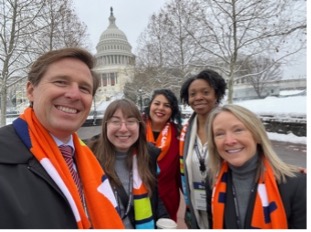
Advocacy
Habitat Ownership Depends on Public Sector Investment
February 2025
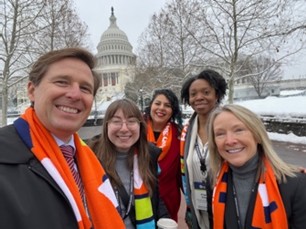
Pictured L-R: Scott Engmann, Abbie Armstrong, Rachel Hagenbaugh (Executive Director, Mitchell Regional Habitat for Humanity), Angela Estes, and Barbara O’Malley
The South Dakota Habitat contingency led by Scott Engmann, urged US Senator John Thune, US Senator Mike Rounds, and US Representative Dusty Johnson to invest in both new and existing solutions to meaningfully expand the supply of starter homes:
- Support the Homeownership Supply Accelerator, Habitat’s innovative federal policy concept designed to rapidly increase construction and rehabilitation of affordable starter homes
- Finalize the fiscal year 2025 appropriations process and provide robust funding for housing and community development federal programs in the fiscal year 2026 budget, including:
- Department of Housing and Urban Development (T-HUD Bill):
- No less than $20 million for the Self-Help Homeownership Opportunity Program
- No less than $1.5 billion for the HOME Investment Partnerships Program
- Department of Agriculture (Ag-Rural Development Bill):
- No less than $1.25 billion for the USDA Section 502 Direct Loan Program
- Department of Housing and Urban Development (T-HUD Bill):
In South Dakota, the lack of affordable homes isn’t just a statistic, it’s a daily reality for families. One in 11 households pay half or more of their income on housing. These challenges exist nationwide, and current programs, while critical, are not enough. To that end, Habitat for Humanity helped to develop the Homeownership Supply Accelerator, a new federal fund designed to regrow the nation’s stock of starter homes in every community that needs them, at prices affordable to low-and moderate-income homebuyers.
Regrowing the nation’s stock of starter homes will expand families’ economic security and stability; enable more businesses to attract and retain essential workers; strengthen economic growth; stabilize distressed neighborhoods and help close our nation’s racial and economic wealth divides.
“Every day, we see families that still can’t afford a safe, stable home,” said Scott Engmann, Black Hills Area Habitat for Humanity Executive Director. “Raising our voices by making in-person Capital Hill meetings is just as important as swinging our hammers when it comes to addressing the affordable housing crisis, and we look forward to working alongside lawmakers to ensure more people have a place to call home.”
At the Habitat on the Hill event, SD Senator Mike Rounds was recognized and awarded as a Habitat for Humanity Housing Champion.
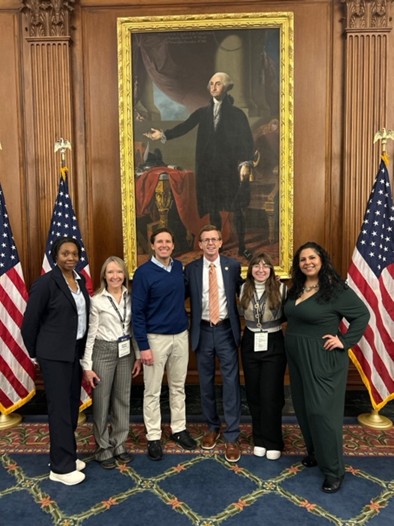
Pictured L-R: Angela Estes, Barbara O’Malley, Scott Engmann, Representative Dusty Johnson, and Rachel Hagenbaugh (Executive Director, Mitchell Regional Habitat for Humanity).
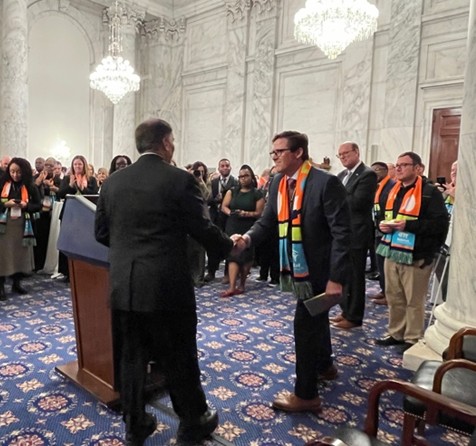
Pictured L-R: Angela Estes, Barbara O’Malley, Scott Engmann, Representative Dusty Johnson, and Rachel Hagenbaugh (Executive Director, Mitchell Regional Habitat for Humanity).
January 2024
Habitat homeownership would not be possible without public sector investment. Federal funding is often the first source of funding for a Habitat home and leverages a significant return on investment through private support from individual donors, congregations, foundations, and corporations. HOME, CDBG SHOP, AmeriCorps and USDA 502 Direct are vital to Habitat success in building stronger communities.
This year, we enjoyed an incredible reception to our 2024 Habitat on the Hill advocacy, where we (along with 450 other Habitat advocates who met with their state reps) had meaningful policy discussions with Senator Mike Rounds, and Kathleen Gayle, his Senior Economic Policy Advisor. Senator Rounds is co-sponsoring and reintroducing key capacity building legislation, Rural Housing Service Reform Act of 2023 (S.2790) in the U.S. Senate for USDA that would result in more timely processing of affordable mortgages in rural South Dakota. We also met with aids from Senator John Thune and Representative Dusty Johnson’s offices. We call upon them to join Senator Rounds in getting this bi-partisan legislation across the finish line, along with increased funding to HOME, SHOP and USDA 502 programs to help make home ownership affordable.
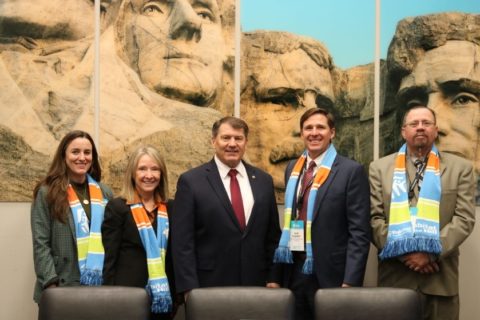
Here is what we asked for:
- Fund the Self-Help Homeownership Opportunity Program (SHOP) at $20 million in the FY2025 Transportation-HUD appropriations bill.
- Fund the Home Investment Partnerships Program (HOME) at $2.5 billion in the
- FY2025 Transportation-HUD appropriations bill.
- Fund the USDA Section 502 Direct Loan Program at $1.5 billion in the FY2025 Agriculture, Rural Development, Food and Drug Administration appropriations bill.
In addition, Congress should enact legislation to dramatically increase the supply of entry-level, affordable homes for homeownership. One current opportunity to address this need is through the bipartisan Neighborhood Homes Investment Act (NHIA).
- NHIA will revitalize distressed neighborhoods and increase housing supply by using tax credits to spur private investment in building and substantially rehabilitating homes for low- and moderate-income homebuyers and homeowners.
We appreciate the hard work our legislators do every day. But we must all do more.
1 in 11 South Dakota households spend more than half of their income on housing.
Lower-income households are especially likely to have unaffordable housing costs, requiring more than 30% of their income.
- 44% of homeowners earning less than $50,000 per year and pay over 30% of their income on housing.
- 23 % of homeowners earning less than $50,000 per year and pay over 50% of their income on housing.
Too many families in the United States and right here in the Black Hills are struggling to afford the cost of home. Soaring rents and home prices have led to a substantial rise in housing cost burdens. Many renters face having to choose between paying for housing or for food, medical care, or other essential expenses. Aspiring homebuyers are increasingly priced out of the housing market, setting back efforts to close homeownership gaps.
Join us in our advocacy for Federal funding to help close the gap for affordable homeownership and critical home repair.
June 2023

While new businesses are attracted to the growing population, the low unemployment rate, and the presence of the expanding Ellsworth Air Force base, the cost of necessities like groceries, gas, and utilities can be overwhelming for the average wage earner. The median household income stands at approximately $55,000, which is only half of what is required to ensure that housing costs remain within 30% of income—a benchmark widely recognized in the industry to guarantee the fulfillment of other crucial needs such as childcare, healthcare, and education.
A 2022 Rapid City Housing Market Summary revealed that Rapid City’s population grew by 15% between 2010 and 2020, and this growth is projected to continue with an estimated increase of 18.9% between 2020 and 2030. Consequently, a housing crisis has emerged at all levels: housing supplies have dwindled, prices have surged, and starting and middle wages fail to support the average costs of rent or homeownership.
To meet the escalating demands of the growing population, our region requires an additional 5,500 housing units by 2030. Failure to address this housing shortage can lead to overcrowded households, a surge in homelessness, and individuals being forced to make difficult choices between securing housing and meeting other essential needs.
In response to this urgent situation, Black Hills Area Habitat is committed to playing its part in resolving the housing crisis. We aim to extend a hand up, rather than a handout, to qualifying home buyers and those in need of critical home repairs. However, it is crucial for all sectors of our community to demonstrate strong leadership and take decisive action. We seek collaboration and partnerships with like-minded public servants, companies, organizations, and non-profits.
Together, let us develop a comprehensive strategy that fosters cooperation among local government, private developers, and nonprofit organizations. Prioritizing the construction of affordable housing units, offering financial incentives to developers, and streamlining regulatory processes are essential steps in promoting the creation of more affordable housing options.
Focusing on new home ownership and preservation of existing housing stock is a unique solution to the housing crisis. We have an opportunity to get ahead of this issue and do so in a very affordable way.
At Habitat, we understand that a house is more than just a physical structure. It forms the very foundation upon which families can build prosperous lives and escape the grips of near-poverty conditions. This transformational process breaks the cycle of poverty, allowing families to focus on education and health. By creating stronger and healthier communities, we can collectively pave the way for a brighter future.
